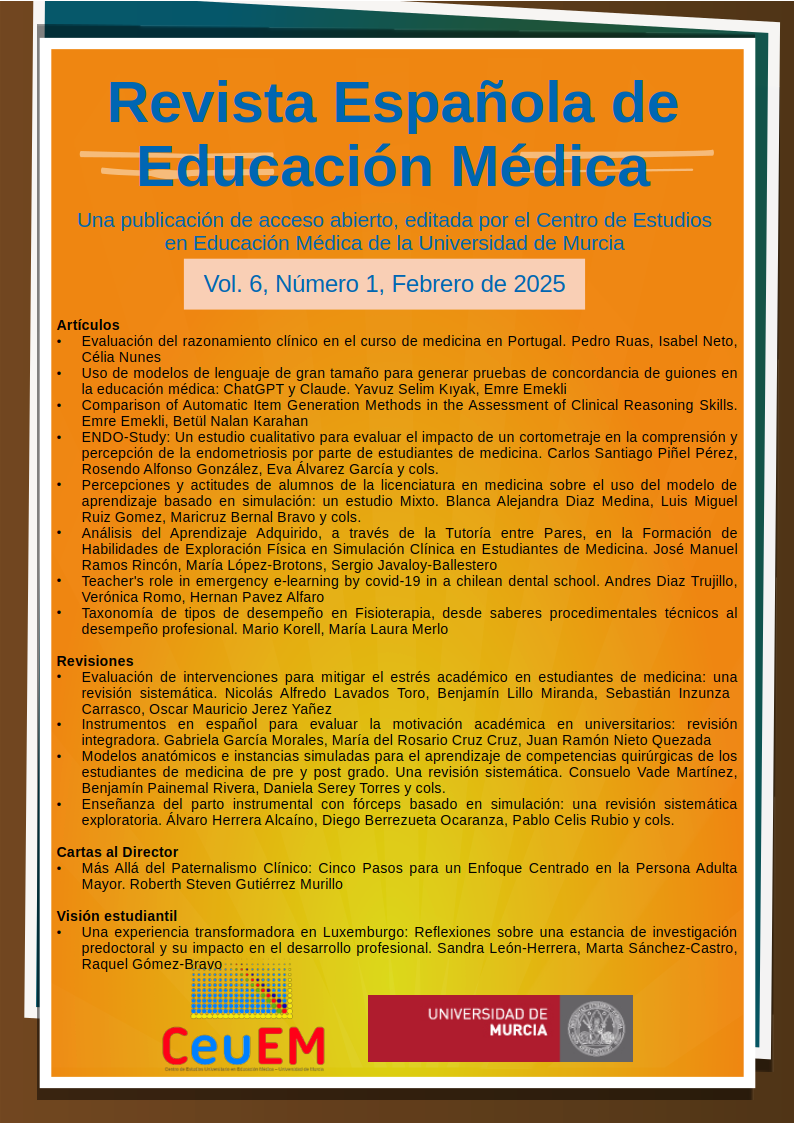Analysis of Learning Achieved through Peer Tutoring in the Development of Physical Examination Skills in Clinical Simulation for Medical Students.
Supporting Agencies
- Programa para la realización de prácticas en actividades de fomento de la investigación en los departamentos e institutos universitarios de la Universidad Miguel Hernández de Elche curso 2023/2024 (Vicerrectorado de Estudiantes y Coordinación) (A-0282/24)
Abstract
Introduction. Peer tutoring refers to when a student from an upper grade teaches a student from a lower grade. The aim of this work is to evaluate the competence in physical examination acquired by medical students through peer tutoring, and to determine the students' satisfaction with this form of teaching in their clinical training. Material and Methods. An observational and cross-sectional pilot study of physical examination workshops conducted by a student tutor using the peer tutoring methodology was carried out. Results. Six physical examination workshops were conducted, distributed in 72 sessions, with the participation of 85 students, of which 50.6% were in their third year and 49.4% in their second year. Each student attended, on average, 2.5 sessions, with a range of 1 to 8 attendances. A significant improvement in knowledge was observed pre and post workshop in the six workshops (mean: 2.4 points, p<0.001), with this improvement being greater in the pulmonary auscultation workshop (mean: 3.6 points; p<0.001) and in the neurological examination workshop (mean: 2.9 points; p<0.001). The improvement in acquired knowledge was greater in second year students (mean: 2.8 points) compared to third year students (mean: 2.2 points; p<0.001). Student satisfaction with the workshops was high. Conclusions. Peer tutoring is a learning method that allows improving physical examination skills in medical students.
Downloads
-
Abstract388
-
pdf (Español (España))276
-
pdf276
References
Godoy J, Vidal A, Illesca M, Espinoza E, Flores L. Rol de tutor par: experiencia de estudiantes de medicina. Rev Med Chil. 2021, 149(5), 765-772. doi:10.4067/s0034-98872021000500765
Vidal-Villa A, Flores-Espina L, Espinoza-Alarcón E, Seguel-Palma F, Godoy-Pozo J. Aprendizaje asistido por pares en la formación clínica de pregrado: percepción de tutores y tutorados. FEM 2021, 24(4), 167-71. https://dx.doi.org/10.33588/fem.244.1132
Li-Valverde VM , Damián Cárdenas ME, Guillén-López OB. Enseñanza asistida por pares en una facultad de medicina de Lima, Perú. El caso de la Sociedad Estudiantil de Ciencias Clínicas. Rev Med Hered. 2021, 32, 246-251. https://doi.org/10.20453/rmh.v32i4.4122
Torrado-Arenas DM, Manrique-Hernández EF, Ayala-Pimentel JO. La tutoría entre pares: una estrategia de enseñanza y aprendizaje de histología en la Universidad Industrial de Santander. MÉD UIS. 2016, 29(1), 71-5. https://doi.org/10.18273/revmed.v29n1-2016008
Reyes-Domínguez SB, Adánez Martínez G, Miñambres Rodríguez M, Gil Ortega D Martínez Salcedo E, García Marcos L. Simulación clínica pediátrica y encuesta de satisfacción del alumno en el grado de Medicina. Edu Med 2024, 25, 100938. https://www.elsevier.es/es-revista-educacion-medica-71-articulo-simulacion-clinica-pediatrica-encuesta-satisfaccion-S1575181324000536
Motola I, Devine LA, Chung HS, Sullivan JE, Issenberg SB. Simulation in healthcare education: a best evidence practical guide. AMEE Guide No. 82. Med Teach. 2013, 35(10), e1511-30. https://doi.org/10.3109/0142159x.2013.818632
Buckley S, Zamora J. Effects of participation in a cross-year peer tutoring programme in clinical examination skills on volunteer tutors' skills and attitudes towards teachers and teaching. BMC Med Educ. 2007, 28, 7-20. https://doi.org/10.1186/1472-6920-7-20
Avonts M, Michels NR, Bombeke K, Hens N, Coenen S, Vanderveken OM et al. Does peer teaching improve academic results and competencies during medical school? A mixed methods study. BMC Med Educ. 2022, 22(1), 431. https://doi.org/10.1186/s12909-022-03507-3
Gripay B, André T, De Laval M, Peneau B, Secourgeon A, Lerolle N, Annweiler C, Justeau G, Connan L, Martin L, Bière L. Benefits of semiology taught using near-peer tutoring are sustainable. BMC Med Educ. 2022, 22(1), 26. https://doi.org/10.1186/s12909-021-03086-9
Avonts M, Bombeke K, Michels NR, Vanderveken OM, De Winter BY. How can peer teaching influence the development of medical students? a descriptive, longitudinal interview study. BMC Med Educ. 2023, 23(1), 861. https://doi.org/10.1186/s12909-023-04801-4
Durá Ros MJ. La simulación clínica como metodología de aprendizaje y adquisición de competencias en Enfermería. Madrid: Universidad Complutense de Madrid, 2013, 295. https://metodoinvestigacion.wordpress.com/wp-content/uploads/2014/11/simuacic3b3n-clc3adnica-como-metodologc3ada-de-aprendizaje-u-complutense.pdf
Benè KL, Bergus G. When learners become teachers: a review of peer teaching in medical student education. Fam Med. 2014, 46(10), 783-7. https://www.stfm.org/FamilyMedicine/Vol46Issue10/Bene783
Sam CP, Nathan JL, Aroksamy JA, Ramasamy N, Mamat NHB, Nadarajah VD. A Qualitative Study on the Experiences of Preclinical Students in Learning Clinical and Communication Skills at a Simulation Centre. Med Sci Educ. 2023, 33(5), 1127-1137. doi: 10.1007/s40670-023-01851-7. https://doi.org/10.1007/s40670-023-01851-7
Dávila-Cervantes A. Simulación clínica. Edu Med 2014, 3 (10), c100-105. https://www.redalyc.org/pdf/3497/349733229006.pdf
Astudillo Araya A, López Espinoza MA, Cádiz Medina V, Fierro Palma J, Figueroa Lara A, Vilches Parra N. Validación de la encuesta de calidad y satisfacción de simulación clínica en estudiantes de enfermería. Cienc Enferm 2017, 23, 133-145. http://dx.doi.org/10.4067/S0717-95532017000200133
Padilla MJ, González J, Sarmiento F, Tripoloni D, Cohen Arazi L. Simulación clínica: Validación de encuesta de calidad y satisfacción en un grupo de estudiantes de Medicina. Rev Esp Edu Med, 2023, 5(1). https://doi.org/10.6018/edumed.591511
Copyright (c) 2024 Servicio de Publicaciones de la Universidad de Murcia

This work is licensed under a Creative Commons Attribution-NonCommercial-NoDerivatives 4.0 International License.
The works published in this magazine are subject to the following terms:
1. The Publications Service of the University of Murcia (the publisher) preserves the economic rights (copyright) of the published works and favors and allows them to be reused under the use license indicated in point 2.
2. The works are published under a Creative Commons Attribution-NonCommercial-NoDerivative 4.0 license.
3. Self-archiving conditions. Authors are allowed and encouraged to disseminate electronically the pre-print versions (version before being evaluated and sent to the journal) and / or post-print (version evaluated and accepted for publication) of their works before publication , since it favors its circulation and earlier diffusion and with it a possible increase in its citation and reach among the academic community.



















